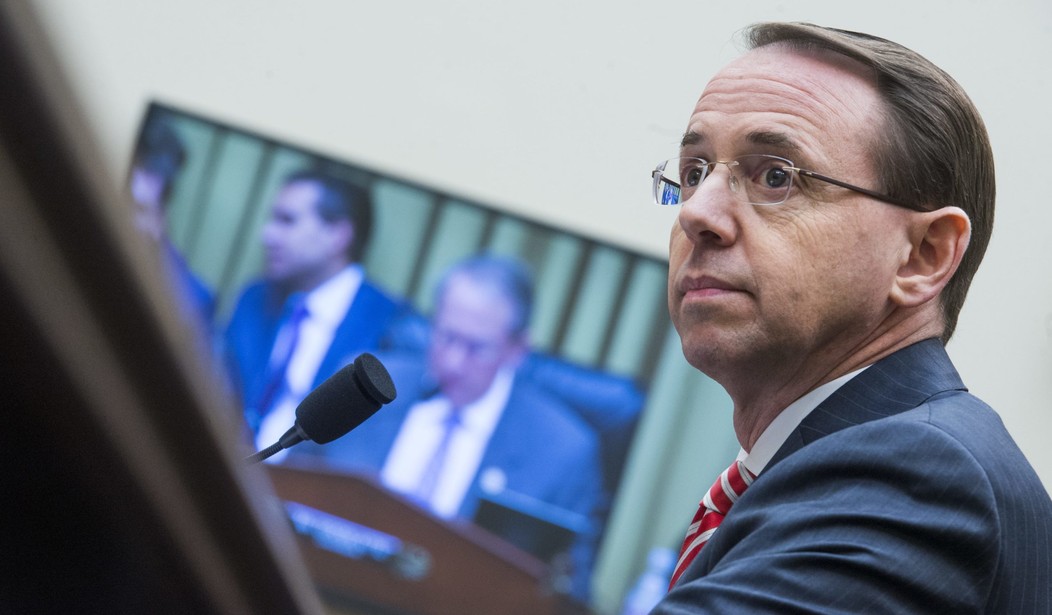WASHINGTON – Rep. Steve Chabot (R-Ohio) today lambasted special counsel Robert Mueller’s assembly of “Democratic partisans” on the Russia investigative team during a hearing in which Deputy Attorney General Rod Rosenstein told Congress he has no good cause to fire Mueller.
Chabot, during an oversight hearing before the House Judiciary Committee, pointed out that nine of Mueller’s 16 lawyers, who bring investigative experience ranging from cybersecurity to organized crime, made political contributions to the Obama or Clinton campaigns, or other Democratic individuals and groups.
“How can you say with a straight face that this group of Democratic partisans are unbiased and will give President Trump a fair shake?” Chabot asked Rosenstein.
Rosenstein, who appointed Mueller, a Republican, responded that political affiliation is different than actual bias, which he has widely discussed with Mueller. The deputy attorney general added that both he and Mueller have extensive experience managing offices in the Department of Justice.
“We recognize we have employees with political opinions, and it is our responsibility to make sure those opinions do not influence their actions, and so I believe that Director Mueller understands that and that he is running that office appropriately,” Rosenstein said.
Chabot said he was initially encouraged by the Mueller selection and assumed that he would pull together an unbiased team for a matter as important as foreign meddling in a U.S. election.
“Rather than wearing stripes as umpires and referees might wear, I would submit that the Mueller team overwhelmingly ought to be attired with Democratic donkeys on their jerseys or ‘I’m with Hillary’ T-shirts, certainly not with ‘Let’s make America great again,’ and I think that’s a shame,” Chabot said. “Because I think the American people deserve a lot better than the very biased team that they’re getting under Robert Mueller, and I think it’s really sad.”
Democrats, including Rep. Jerry Nadler (N.Y.), who replaced Rep. John Conyers (D-Mich.) as ranking member, asked Rosenstein if he has good cause to fire Mueller.
“No,” Rosenstein responded.
Though he declined to disclose any communication he’s had with President Trump, Rosenstein said the president has not asked for Mueller’s removal. He also added that he has no fears that the president will fire him.
“If there were good cause, I would act,” Rosenstein said during a more than five-hour hearing. “If there were no good cause, I would not.”
The Justice Department today delivered hundreds of text messages to Congress between two FBI officials who were romantically involved and shared anti-Trump messages. Peter Strzok, who was removed from the investigation by Mueller in July, and FBI lawyer Lisa Page exchanged hundreds of messages, some with partisan sentiments, dating back to at least 2015.
Chairman Bob Goodlatte (R-Va.) called the text messages between Strzok and Page one of many examples of “extreme bias” on the Mueller team.
“We are now beginning to understand the magnitude of this insider bias on Mueller’s team,” Goodlatte said. “Aren’t DOJ attorneys advised to avoid even the appearance of impropriety?”
Goodlatte also grilled Rosenstein on Section 702 of the Foreign Intelligence Surveillance Act. Congress is currently deciding whether to the reauthorize the program, which is set to expire at the end of the year. Section 702 allows agencies to track international communications with foreign targets suspected of terror plots and other harmful acts, and has incidentally resulted in the collection of personal information from tens of thousands, if not millions, of Americans.
Rosenstein and Goodlatte agreed it’s essential that Section 702 be reauthorized, but Goodlatte said it’s also essential to protect the civil liberties of Americans, particularly from unreasonable searches.
The two seemed to disagree over what constitutes a reasonable search. Goodlatte has introduced legislation that would require law enforcement to obtain a warrant to delve deeper into Americans’ information beyond the initial query of a foreign target.
“I’m not aware of (warrantless searches) being appropriate in any other type of investigation that they might conduct,” Goodlatte said.
“It really is critical to national security that the FBI have the ability to query the data,” Rosenstein said, adding that law enforcement is trying to avoid a situation where the U.S. “re-erects a wall that would prevent the FBI from gaining access to information that might allow them to connect a lead to information that implicates national security.”









Join the conversation as a VIP Member